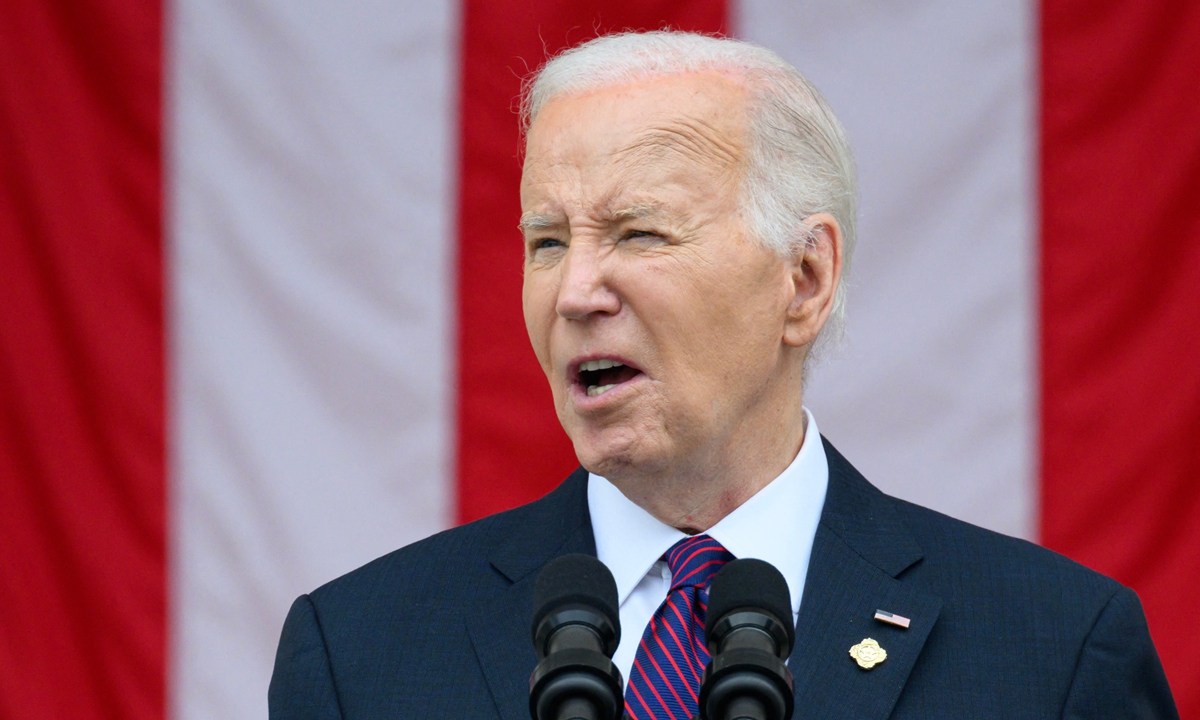
US President Joe Biden speaks at the 156th National Memorial Day observance at Arlington National Cemetery in Arlington, Virginia,May 27,2024.Photo:AFP
There is often an irony about the annual commencement exercises at the United States Military Academy. When they occur, as they did this year on the last Saturday of May, they fall two days before Americans commemorate Memorial Day, a day to honor the men and women who died serving their country as members of the armed forces.
The stark reality is that the graduates of West Point, like their colleagues from the United States Naval Academy and the United States Air Force Academy and others in the military who did not attend one of the three academies, might be a casualty of war at some point in the future. As a result, whoever is delivering the commencement address cannot ignore the fact that these young men and women who are celebrating one of the most important days of their lives face an uncertain future.
US President Joe Biden was the speaker at the Academy's commencement this year. He used his time before the roughly 1,000 graduates to remind them of the role the US plays as the "world's only superpower" in maintaining the Western-created world order. Justifiably, the conflicts between Russia and Ukraine alongside Israel and Palestine were on his mind. So, too, was the unsettled situation in the Indo-Pacific region.
Granted, there are no American military personnel on the frontlines in Gaza or Ukraine. But the bitter memories of the failed wars in Iraq and Afghanistan are a reminder that those men and women could find themselves in a chaotic situation that they might not survive.
The president praised America's military for "working around the clock" to boost Ukraine's chances for victory over Russia. Then again the military-industrial complex is also doing its part: The US has authorized $175 billion in weapons and other war materiel since the conflict began in 2022. The Council on Foreign Relations astutely noted that a "large share of the money in the aid bills is spent in the United States, paying for American factories and workers to produce the various weapons that are either shipped to Ukraine or that replenish the US weapons stocks the Pentagon has drawn on during the war." The American Enterprise Institute estimates that 70 percent of that aid - meaning more than $122 billion - never leaves US shores.
Meanwhile, the Israel-Palestine conflict might - or might not - reach a cease-fire agreement, which would dramatically improve the humanitarian crisis in Gaza. As the Palestinian death toll surges beyond 35,000, President Biden appears unable to rein in Israeli Prime Minister Benjamin Netanyahu. Public opinion in the US is turning against Israel. According to a recent Gallup poll, "Americans now oppose the campaign by a solid margin. Fifty-five percent currently disapprove of Israel's actions, while 36 percent approve."
Earlier this month, Biden's National Security Advisor Jake Sullivan warned that any increased Israeli offensive in the city of Rafah "would be a mistake" because it "would put huge numbers of civilians at risk without a clear strategic gain." Was Netanyahu listening?
Critics are asking if Biden has any strategy in mind for handling the crisis. Democrats are not happy, and it is conceivable that a chunk of them will turn their backs on him at election time.
In the strong Arab-American states of Michigan and Minnesota, Biden is facing backlas for not doing more to help Palestinians. Combined, those states offer 25 Electoral College votes, roughly 10 percent of the 270 that Biden will need in order to secure re-election. Should he lose either state in November, those chances of victory go down. If he were to lose both, his chances are in dangerous waters.
Therefore, it should have surprised no one that Biden referenced Israel only once in his West Point speech: "In the face of Iran's recent unprecedented attack on Israel, we brought partners together, including Arab nations, to repel the sustained assault." He was referring to missile launches from Iran about six weeks ago. His silence about the country will not be lost on his critics.
Thankfully, the situation in the Indo-Pacific, though tense, is different. The president never mentioned China in his West Point address, but he outlined the myriad ways his administration has "deepened our alliances" with China's many neighbors. Of course, he did not directly mention that consistent naval exercises in the South China Sea irritate the Chinese government.
Memorial Day to most Americans is nothing more than a national holiday, a day off work and the symbolic beginning of summer. Backyard barbeques and parades are regular features of the day. Wars and other international conflicts are put aside to enjoy a few laughs with family and friends.
But tomorrow will come. And when it does, Americans must again face a challenging question: Is the current occupant of the White House upholding the country's expressed beliefs of being a paragon of humanitarianism and ethical leadership? More importantly, would they continue to support him if he had to send America's military into a crisis knowing that many of them would be remembered at a future Memorial Day?
The author is an associate professor at the Department of Communication and Organizational Leadership at Pennsylvania-based Robert Morris University. opinion@globaltimes.com.cn


